
Four key facts about Britons who play racing video games on console or PC
Racing is one of the oldest video game genres: its history can be traced back to arcade games like Ridge Racer and Out Run through to modern-day megafranchises like Forza Motorsport and Gran Turismo.
But how do console/PC racing gamers compare to the general console/PC gaming public?
Here are five key takeaways.
- Racing gamers are more likely to be men than regular console/PC gamers
Among Britons who play racing games, 76% are men, while just 24% are women. This is compared to 67% vs. 33% of regular gamers.
2. Racing gamers are less likely to be over 55 – but more likely to be 35-54
Along age lines, they’re about as likely to be aged 18-34 (48% vs. 47%), more likely to be 35-54 (45% vs. 37%), and much less likely to be over 55 (7% vs. 16%). In a world where esports players often retire by 25, could deteriorating reflexes play a part?
3. Racing gamers play longer…and harder?
While three in ten (31%) regular gamers play video games for over 7 hours a week, this rises to 41% of racing gamers. Some 55% also describe themselves as hardcore/keen gamers, compared to 41% of regular gamers.
4. Racing gamers are much more likely to play to video games to seek a challenge.
Some 36% of racing gamers say they’re in it to challenge themselves – compared to just 19% of regular gamers. The top motivations for this group, though, are relaxation (83% vs. 69%), passing the time (58% vs. 53%), and escapism (48% vs. 40%).
Make smarter business decisions with better intelligence. Understand exactly what your audience is thinking by leveraging our panel of 20 million+ members. Speak with us today.
YouGov Profiles is based on continuously collected data and rolling surveys, rather than from a single limited questionnaire. Profiles data for Great Britain is nationally representative of the online population and weighted by age, gender, education, region, and race. Learn more about Profiles.